International Muslim concern at minaret vote
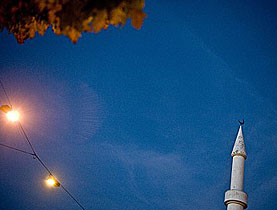
Reaction to the Swiss anti-minaret vote in the wider Islamic community has reflected shock, sadness and concern, but also a determination to try to build bridges.
The vote revealed the hidden fears of many Swiss, and Muslims should respond by trying to build harmony across society, a leading Muslim scholar says.
The reaction of Ali Gomaa, the grand mufti of Egypt, was echoed by a number of other Muslim scholars and commentators whom swissinfo.ch spoke to outside Switzerland.
“This result should draw our attention to the reality of the hidden fears which have been underestimated by decision makers,” said Gomaa.
“We think that priority should be given to meeting the challenge of building societies capable of integrating diversity and difference… and we are ready to give every support to such an effort,” he told swissinfo.ch.
The grand mufti is the highest official of religious law in a Sunni Muslim country. Gomaa is regarded as a champion of moderate Islam.
“My first reaction is one of surprise and disappointment,” Babacar Ba, the Geneva ambassador of the Organisation of the Islamic Conference (OIC), told swissinfo.ch.
“It is a bad answer to a bad question. I fear that this kind of thing is simply a gift to extremism and intolerance.”
“I think we must be very vigilant in the face of the upsurge of islamophobia,” he added. “This vote is an open door to the dangerous process of calling fundamental freedoms into question.”
Islamophobia
It had been widely expected that the ban would be rejected by voters, but Jaber al-Alawani, a Muslim thinker and director of the Cordoba Institute in the United States, told swissinfo.ch that he was not surprised.
“Islamophobia is widespread in Europe, all the more so because rightwing extremists see it as a kind of defence of European identity, which they haven’t so far quite been able to define.”
A British Muslim, Imam Abduljalil Sajid, imam of Brighton, and a member of the national executive committee of Interfaith UK, warned that ordinary Muslims were likely to react angrily, even though, as he stressed, the minaret is not a religious requirement.
“It will be seen negatively throughout the Muslim world, [as yet] another problem of Islam versus the West. I don’t want to see it develop negatively, but unfortunately that will be the case,” he told swissinfo.ch.
Palestinian law professor Anwar Abu Aisheh, speaking to the Swiss News Agency, agreed.
“The vote will give arguments to Muslim extremists. They will see a frontal attack against Islam and its symbols,” he warned.
Measured response
Despite the disappointment felt by many Muslims, Gomaa called for a measured response.
“It is really important not to exploit this result wrongly for political ends, but to regard it as a call to build cooperation and harmony between our different religions and societies, in a new spirit,” he said.
Ba agreed on the importance of not over-reacting and of trying to build bridges.
“The main thing is to keep calm and to realise how much work still needs to be done to defend basic freedoms. I think we must do this by … taking a constructive part in the debate on all issues which cause fear and concern, and to try to bring people together in order to confront extremism wherever it comes from.”
Alawani also appealed to Swiss Muslims to keep calm.
“Avoid irrational reactions, and respect the views of the Swiss voters,” he said.
Misfer al-Kahtani, a Muslim thinker from Saudi Arabia agreed. He pointed out that many Swiss had voted against the initiative, but said that the Muslim minorities in Europe had to take into account the fears that many Europeans have about their religion.
“The real challenge is for the Muslim community to accept the decision by Swiss society … and work to change the clichés adopted by those who called for the ban on minarets, by showing a good example and applying the ideas and values of Muslim civilisation,” he told swissinfo.ch.
Freedoms
A number of commentators reflected on what the vote said about Switzerland.
“Switzerland is noted for its capacity to integrate culturally diverse components … and article 15 of the Swiss constitution guarantees freedom of conscience and belief,” Gomaa commented.
“This isn’t a show of racism by the Swiss, just an upsurge of selfishness, [they are] worried that nothing should come and trouble their peace,” said law professor Abu Aisheh.
Mohamed Munir al-Ghodban, a Muslim thinker from Syria, pointed out that minarets had nothing to do with the basic tenets of Islam. But he also told swissinfo.ch that Muslims in Switzerland felt the vote interfered with their religious practices “which contradicts the basic principles of freedom and democracy, which Switzerland has been so proud of for such a long time.”
Praise from European right
“Extreme right groups everywhere, in France, in Holland or anywhere in the world will use this vote in their favour,” Imam Sajid warned, and immediate comments by rightwing leaders bear him out.
There were warm words of praise for the Swiss vote from Italy’s Reform Minister, Roberto Calderoli, who told the Italian news agency ANSA that a clear sign had come from Switzerland: “Yes to church towers, no to minarets”. He said Switzerland should be a model for Italy in this respect.
The head of Austria’s rightwing Freedom Party, quoted by the Austrian news agency, also sees Switzerland as a model, a sentiment echoed by the general secretary of another rightwing party, the Alliance for the Future of Austria.
Marine le Pen, of the French National Front, said in a statement on the party’s website that the Swiss had demonstrated their attachment to their “national identity, their countryside and their culture”, despite calls from the “élites” not to vote in favour of the ban.
Julia Slater, swissinfo.ch
A minaret initiative was handed in to the government in July 2008 after more than the required 100,000 signatures were collected. The text is only one sentence long: “The building of minarets is forbidden.”
The government’s response, calling on the electorate to reject it, was much longer, running to 50 pages. In essence, the cabinet argues that the prohibition of the spires, usually found outside mosques, would violate international human rights norms. It also said that a ban would hinder integration and would be ineffective in the fight against extremism.
The country’s Muslim community says it is stunned by what it sees as an “Islamophobic” move, which it warns will undermine already fragile relations.
Both the Protestant and Catholic churches rallied to their defence, along with most political parties, human rights experts and a number of cabinet ministers.
In Switzerland, only the mosques in Geneva, Zurich and Wangen near Olten have a minaret, Winterthur’s mosque only has a small one. But the call to prayer is not made from these minarets.
Building applications for minarets in at least two other towns, Langenthal and Wil, led to heated debates at the local level.

In compliance with the JTI standards
More: SWI swissinfo.ch certified by the Journalism Trust Initiative
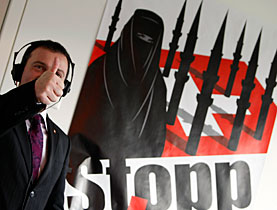
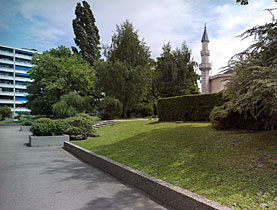
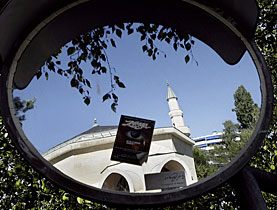
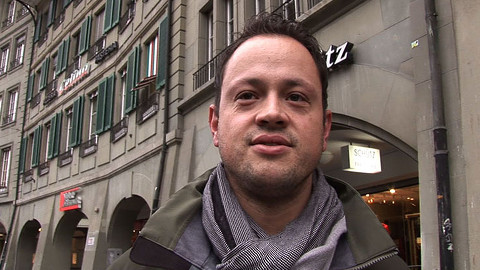
You can find an overview of ongoing debates with our journalists here. Please join us!
If you want to start a conversation about a topic raised in this article or want to report factual errors, email us at english@swissinfo.ch.